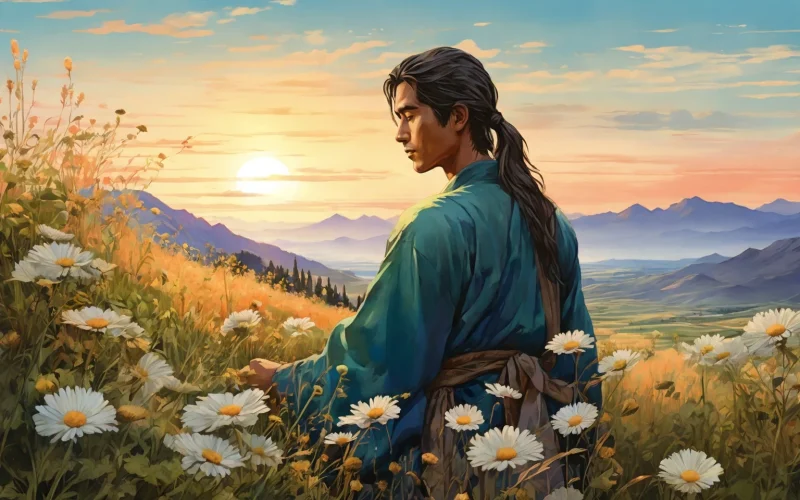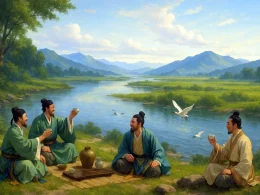A lonely, dreary bird astray
Still flies near the end of the day.
It hovers here and there, its cries
Have darkened night and saddened skies.
Is it longing for morning clear
Or a resting tree far or near?
Seeing a pine of towering height,
Folding its wings, it will alight.
No tree can stand a furious blast,
Which this shady pine can outlast.
The bird has found on it a nest,
For a long time here it will rest.
Original Poem
「饮酒 · 其四」
陶渊明
栖栖失群鸟,日暮犹独飞。
徘徊无定止,夜夜声转悲。
厉响思清远,去来何依依。
因值孤生松,敛翮遥来归。
劲风无荣木,此荫独不衰。
托身已得所,千载不相违。
Interpretation
This poem was composed after Tao Yuanming's retreat to rural life, as the fourth piece in his Drinking Wine series. During this turbulent period of the Eastern Jin dynasty, with Liu Yu manipulating the emperor and usurpation imminent, Tao—though physically removed from politics—remained spiritually concerned for his country. Through the metaphors of a "stray bird" (self-representation) and a "lone pine" (moral ideal), the verses articulate his resolution to embrace reclusion after life's wanderings, embodying his steadfast commitment to spiritual constancy.
First Couplet: "栖栖失林鸟,日暮犹独飞。"
Qī qī shī lín niǎo, rìmù yóu dú fēi.
Restless, a bird strayed from its woods,/ At dusk still flies alone.
The "stray bird" symbolizes Tao's earlier rootless existence in officialdom, reflecting both his physical displacement and spiritual solitude.
Second Couplet: "徘徊无定止,夜夜声转悲。"
Páihuái wú dìng zhǐ, yèyè shēng zhuǎn bēi.
Drifting without respite,/ Nightly its cries grow more forlorn.
The intensifying nocturnal cries mirror the poet's midlife anguish—a crescendo of existential uncertainty.
Third Couplet: "厉响思清远,去来何所依?"
Lì xiǎng sī qīng yuǎn, qù lái hé suǒ yī?
Fierce calls yearn for distant purity—/ Where to rest this coming and going?
The rhetorical question crystallizes Tao's dilemma: Where does one anchor oneself when conventional paths (career, society) prove hollow?
Fourth Couplet: "因值孤生松,敛翮遥来归。"
Yīn zhí gū shēng sōng, liǎn hé yáo lái guī.
Then it meets a lone pine,/ Folds wings to alight from afar.
The "lone pine" emerges as both physical sanctuary (his farmstead) and ethical compass—its solitary resilience mirroring Tao's resolve.
Fifth Couplet: "劲风无荣木,此荫独不衰。"
Jìng fēng wú róng mù, cǐ yīn dú bù shuāi.
Fierce winds strip all trees bare,/ This shade alone endures.
The pine's unwavering shelter amidst storms becomes a testament to moral fortitude against societal corrosion.
Sixth Couplet: "托身已得所,千载不相违。"
Tuō shēn yǐ dé suǒ, qiān zǎi bù xiāng wéi.
Having found its abode,/ For millennia it won't stray.
The closing lines affirm eternal commitment—Tao's declaration of unbreakable fidelity to his chosen path.
Holistic Appreciation:
The poem traces an arc from dislocation to homecoming through its avian allegory. The "stray bird's" initial desperation (couplets 1–3) transforms into purposeful resolve upon encountering the "lone pine" (4–6), symbolizing Tao's rejection of political compromise for spiritual authenticity. Its profundity lies in rendering existential crisis and resolution through deceptively simple natural imagery—a hallmark of Tao's plain surface, deep currents aesthetic.
Artistic Merits
This poem employs symbolism as its core technique, using the imagery of a "stray bird" and a "solitary pine" to portray the poet's psychological journey of self-metaphor, self-reflection, and self-liberation. With its simple and natural language that seamlessly blends scene and emotion, it expresses ideals through objects while maintaining profound subtlety. This work stands as a paradigmatic example in Tao Yuanming's poetry of conveying emotions through allegory and expressing aspirations by entrusting them to objects.
Insights
Tao's journey from "straying" to "alighting" models a universal paradigm: true belonging requires both courageous detachment (leaving the "woods" of convention) and wholehearted commitment (the pine's "millennia" pledge). For contemporary readers, it speaks to the necessity of ethical rootedness in an increasingly fragmented world—how one might weather political/social tempests by cultivating inner resilience. The pine's enduring shade offers an ecological metaphor for sustainable virtue.
Poem translator
Xu Yuanchong (许渊冲)
About the poet

Tao Yuanming(陶渊明), 365 – 427 CE, was a poet, literary figure, fu writer, and essayist active during the late Eastern Jin and early Liu Song dynasties. Born in Chaisang (near present-day Jiujiang, Jiangxi Province), he pioneered a new genre of pastoral-themed literature, expressing profound philosophical insights through simple language. His poetic style became an enduring aesthetic standard in classical Chinese poetry.











